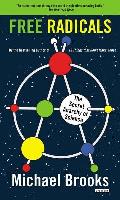 Free Radicals: The Secret Anarchy of Science
Free Radicals: The Secret Anarchy of ScienceBy Michael Brooks
Profile Books Ltd (2011)
“Free Radicals” is a selection of juicy bits from the history of science, telling stories about how scientists break and bend rules to push onward and forward, how they fight, cheat and lie to themselves and to others. The reader meets well-known scientists (mostly dead ones) who fudged data, ignored evidence, flirted their way to lab equipment, experimented on themselves or family members, took drugs, publicly ridiculed their colleagues, and wiggled their way out of controversy with rhetorical tricks.
The book is very enjoyable as a collection of anecdotes. It is fast flowing, does not drown the reader in historical, biographical or scientific details, and it is well-written without distracting from the content. (I’ve gotten really tired of authors who want to be terribly witty and can’t leave you alone for a single paragraph).Michael Brooks tries to convince the reader that there is a lesson to be learned from these anecdotes, which is that science thrives only because of scientists behaving badly in one way or the other. He refers to this as the “secret anarchy of science”. He actually disagrees with himself on that, as it becomes very clear from his stories that far from being anarchic, science is an elitist meritocracy that grandfathers achievers and is biased against newcomers, in particular members of minorities. Anarchy is unstable – it’s a vacuum that gets rapidly filled with rules and hierarchies – and academia is full with these unwritten rules. Science is not and has never been anything like anarchic, neither secretly nor openly, though the house of science has arguably housed its share of rebels.
Worse than that misuse of the term ‘anarchy’ is that Brooks tries to construct his lesson from a small and hand-picked selection of examples and ignores the biggest part of science, which is business as usual. As we discussed in this earlier post, the question is not whether there are people who bent rules and were successful, but how many people bent rules and just wasted everybody’s time, a problem to which no thought is given in the book.
Luckily, Brooks does not elaborate on his lessons too much. The reader gets some of this in the beginning and then again in the end, where Brooks also uses the opportunity and tries to encourage scientists to engage more in policy making. Again he disagrees with himself. After he spent two hundred pages vividly depicting how scientists care about nothing but making progress on their research, arguing that this single-mindedness is the secret to scientific progress, in the last chapter he now wants scientists to engage more in politics, but that square block won’t fit through the round hole.
In summary, the book is a very enjoyable collection of anecdotes from the history of science. It would have benefitted if the author had refrained from trying to turn it into lessons about the sociology of science.

I think you were a little kind - this was my reaction: http://www.popularscience.co.uk/?p=689
ReplyDeleteBrian,
ReplyDeleteYeah, I can see where you're coming from... I am guessing I found the book more valuable than you because most of the stories (esp those outside physics) were new to me.
An accountant honestly balances books. Research has sparse data and ill-defined books. A manager given money and authority is responsible and liable for their ethical application. A Moo U biologist studied cultured cells in electric fields but was not quite competent for apparatus design. He observed an anomaly, then willfully violated his grant funding to discover Cisplatin. Should he be discharged for cause?
ReplyDeleteProper management would end him and retain patent rights, discouraging future insubordination. Managed research actively excludes serendipity - even to barring lab entry outside hours and on weekends ("unknown safety risks"). If you pull a feather out of your butt, there had better be a bird attached. It never happens in an HR-staffed and professionally managed Korporate Kulture. ISO600x is bulletproof. (CERN's LHC magnet quench dump brazes were not bullets.)